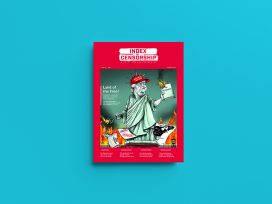
While civilizational rhetoric in the West reflects a sense of threat, globally it is recognition-seeking. Common to all civilizationalisms, however, is a blurring of the distinction between authoritarianism and democracy.
Religious ideology is on the rise in populist politics. Has secularism, once a pillar of liberal democracies, taken a back seat, or is it transforming? An Abrahamic roundtable.
Thughout human history institutional religion has served political purposes, but there have also long been attempts to curb personal moral beliefs in taking over the entirely of the public sphere. Let us bring up just a few ancient examples.
We know of some ancient greek city states which embraced secular practices by distinguishing legislative and civic matters from the influence of their pantheon of gods and goddesses. The Essenes, who created the Dead Sea Scrolls, are thought to have been a Jewish faction just before the time of Jesus who criticised the leaders of Second Temple Judaism for their material gains and practice of power, and established their own colonies practicing purity laws to an extreme. And even Jesus of Nazareth had a lot to say about the corruption of some religious leaders.
During the Middle Ages, Christians also used the term ‘secular’ to refer to worldly matters, in contrast to spiritual or heavenly concerns. Eighteenth century Enlightenment championed ideas and practices that centered on the secular realm and is often considered its modern starting point. But this idea had long been in development.
The entirety of medieval European history is loaded with conflicts around the matters of state and church, and how they should be interacting. Holy Roman emperors and British kings battled with popes in investiture conquests about who gets to appoint a bishop or who can crown a ruler – and so much more.
In today’s Czechia the Hussites demanded the separation of spiritual practices from statecraft and lay power as early as 1419, and fought decades of wars over it and ultimately won against the Roman Catholic church and informing the movements who came after them, including Matin Luther, Jean Calvin and Henry VIII.
Meanwhile, Muslim rulers had long established a much more flexible and pragmatic practice centruies before, allowing across the middle East, Southern Europe, Asia and Africa for relative religious tolerance and carving out a space for science and the arts. This is the heritage that later Christian thinkers like Thomas Aquinus built ondeveloping their theorisc of scholasticism, pushing the Church of Rome toward a more flexible attitude.
The kind of secularism today’s liberal democracies claim as an organizing principle draws most heavily on the legacy of the French Revolution of 1789. Ultimately the idea is that matters of faith and spirituality should be kept separate from the excercise of power, both to allow individual citizens their own freedom of conscience, and to make sure that the state does not discriminate on the basis of faith.
And quite like the French Revolution, today’s politics can also sometimes take secularism to extremes. France leads the charge, they have banned headscarves, the kippa, turbans, and large crosses in schools since 2004. A controversial muslim veil ban came in effect in 2010 and evoked even more criticism with the infamous burkini ban in 2017.
On of today’s guests, Omar Sayfo argues that, in some cases, militant secularism can be used as a tool to disguise for po litical racism against minorites – for example when is comes to the anti-Muslim sentiment that arose since 2000.
And in this regard, it’s quite similar to the extremes of religious leadership. Secularism and religion have both been used as multitools: from crusades in the Middle East ultimately toppling even the Christian empire of Byzantium, to European conquistadors committing the gratest genocide in human history in the Americas, to the present day tragedy unfolding in Gaza. And yet, we see religion in service of humanity in the same places and more. So let’s unfold a bit more nuance today with some of my Abrahamic brethren.
Dóra Laborczi is a journalist with a strong background in theology, civic and social organizations as well as church media. Her three main areas of focus are feminism, Christianity, and public life.
Omar Sayfo, is the Director of research at the Migration Research Institute at the MCC. He earned his PhD in 2016 from Utrecht University and is an esteemed Middle East expert.
Jonatán Megyeri is an orthodox rabbi, journalist and influencer, who speaks to wide audiences about Judaism and about foreign affairs politics. Megyeri is a frequent guest in various TV, radio and podcast shows, while his social media channels reach hundreds of thousands.
We owe a great big thank you to the CEU Library in Budapest for hosting us!
Réka Kinga Papp anchor
Daniela Univazo writer-editor
Merve Akyel art director, Eurozine
Szilvia Pintér producer
Julia Sobota captions and translations
Zsófia Gabriella Papp digital producer
Priyanka Hutschenreiter project manager
Judit Csikós head of finance
Réka Kinga Papp editor-in-chief
Csilla Nagyné Kardos office administration
Gergely Áron Pápai DoP
Daniel Pitz camera
István Nagy sound
Nóra Ruszkai video editor
István Nagy lead video editor
Milán Golovics dialogue editor
Dániel Nagy dialogue editor
Victor Maria Lima animation
Crypt-of-Insomnia theme music
This talk show is a Display Europe production: a ground-breaking media platform anchored in public values.

This programme is co-funded by the European Commission and the European Cultural Foundation.
Importantly, the views and opinions expressed here are those of the authors and speakers only and do not necessarily reflect those of the European Union or the European Education and Culture Executive Agency (EACEA). Neither the European Union nor the EACEA can be held responsible for them.

Published 1 January 2025
Original in English
First published by Eurozine
© Standard Time talk show / Eurozine / Display Europe
PDF/PRINTSubscribe to know what’s worth thinking about.

While civilizational rhetoric in the West reflects a sense of threat, globally it is recognition-seeking. Common to all civilizationalisms, however, is a blurring of the distinction between authoritarianism and democracy.

Free speech in the US: how book bans are targeting independent thought; why Trump’s assault on education imitates Erdoğan’s; what the closure of Radio Free Asia means for the region’s information space; and how American liberals can learn from Soviet dissidents.